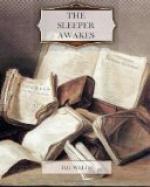The way ran deviously through a maze of buildings. They came at last to a passage that curved about, and showed broadening before him an oblong opening, clouds hot with sunset, and the ragged skyline of the ruinous Council House. A tumult of shouts came drifting up to him. In another moment they had come out high up on the brow of the cliff of torn buildings that overhung the wreckage. The vast area opened to Graham’s eyes, none the less strange and wonderful for the remote view he had had of it in the oval mirror.
This rudely amphitheatral space seemed now the better part of a mile to its outer edge. It was gold lit on the left hand, catching the sunlight, and below and to the right clear and cold in the shadow. Above the shadowy grey Council House that stood in the midst of it, the great black banner of the surrender still hung in sluggish folds against the blazing sunset. Severed rooms, halls and passages gaped strangely, broken masses of metal projected dismally from the complex wreckage, vast masses of twisted cable dropped like tangled seaweed, and from its base came a tumult of innumerable voices, violent concussions, and the sound of trumpets. All about this great white pile was a ring of desolation; the smashed and blackened masses, the gaunt foundations and ruinous lumber of the fabric that had been destroyed by the Council’s orders, skeletons of girders, Titanic masses of wall, forests of stout pillars. Amongst the sombre wreckage beneath, running water flashed and glistened, and far away across the space, out of the midst of a vague vast mass of buildings, there thrust the twisted end of a water-main, two hundred feet in the air, thunderously spouting a shining cascade. And everywhere great multitudes of people.
Wherever there was space and foothold, people swarmed, little people, small and minutely clear, except where the sunset touched them to indistinguishable gold. They clambered up the tottering walls, they clung in wreaths and groups about the high-standing pillars. They swarmed along the edges of the circle of ruins. The air was full of their shouting, and they were pressing and swaying towards the central space.
The upper storeys of the Council House seemed deserted, not a human being was visible. Only the drooping banner of the surrender hung heavily against the light. The dead were within the Council House, or hidden by the swarming people, or carried away. Graham could see only a few neglected bodies in gaps and corners of the ruins, and amidst the flowing water.
“Will you let them see you, Sire?” said Ostrog. “They are very anxious to see you.”
Graham hesitated, and then walked forward to where the broken verge of wall dropped sheer. He stood looking down, a lonely, tall, black figure against the sky.
Very slowly the swarming ruins became aware of him. And as they did so little bands of black-uniformed men appeared remotely, thrusting through the crowds towards the Council House. He saw little black heads become pink, looking at him, saw by that means a wave of recognition sweep across the space. It occurred to him that he should accord them some recognition. He held up his arm, then pointed to the Council House and dropped his hand. The voices below became unanimous, gathered volume, came up to him as multitudinous wavelets of cheering.




